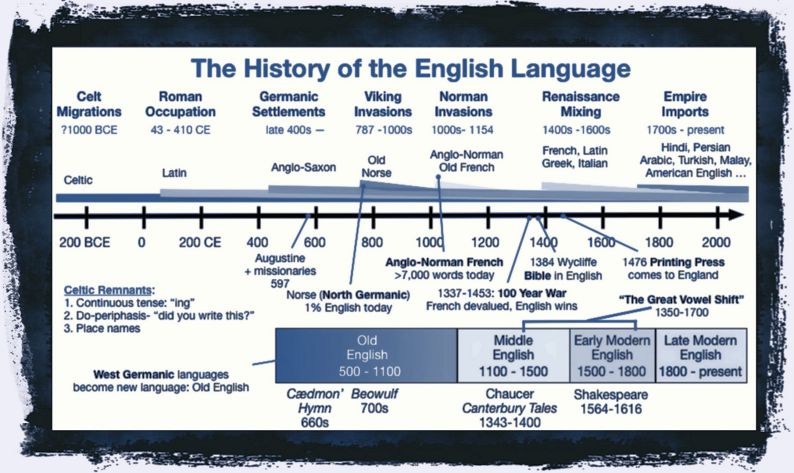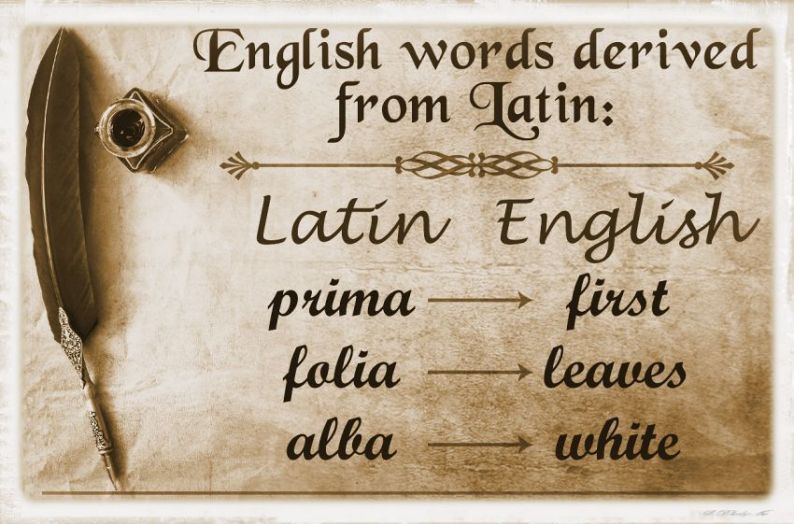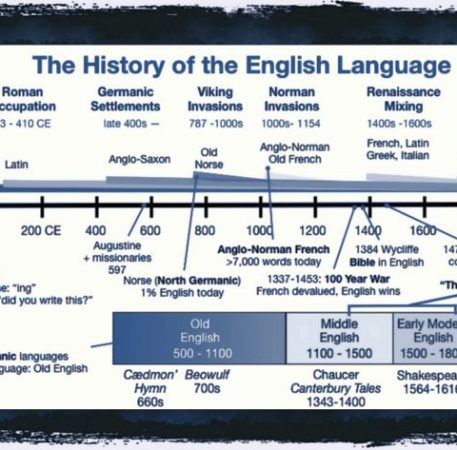
Short history of English, a brief article about the English Language and its development through the Celtic, the Roman, the Danish and the Norman invasions.
The Iberians. The prehistoric inhabitants of Britain seem to have been of the iberian type; we know, however, that they belonged to many different races. They dwelt in small huts and lived on hunting and fishing. Century after century they improved in civilization: they attained some skill in agriculture, built the first cities and temples. Their gods were trees, rivers, some animals and particularly the sun and the moon.
The Celtic Invasion. The Britons (600B.C.- 43 A.D.) At some indetermined period, several centuries before Christ, new tribes of Celtic origin began to occupy the British Isles. The belonged to the Aryan family and probably came from West central Asia. These Celts, phisically tall, fair-haired and blue-eyed, were called Britons. They came in successive waves and settled first in Scotland, Ireland and in the Isle on Man; later in England and Wales. They killed or subjugated the Iberians and by 600 B.C. they were definitely established in Britain. Their chief occupations were agriculture, hunting, fishing, cattle-breeding and metal-working, (Iron age). They were also merchants and had come into business relations with otyher peoples to whom they exported iron, tin and lead. They were organized in tribes often at war with each other. Their weapons were in bronze or in iron, but they also used bows and arrows in battle. The Britons practised a politheistic religion called Druidism and their priests, called Druids, constituted the ruling class in society: they were prophets, judges, doctors and teachers. Druidism was founded on the belief of the transmigration and immortality of the soul. The Britons considered the oak and the mistletoo as sacred plants; they worshipped the sun, the moon and offered human sacrifices. They celebrated magic rites in the forests. Celtic was, therefore, presumably the first Indo-European language to be spoken in the country we now know as England. By the 4th century BC, the Gauls (Latin: Galli), who were a group of Celtic peoples of West-Central Europe, spread over much of what is now France, Belgium, Spain, Portugal, Switzerland, Southern Germany, Austria, the Czech Republic and Slovakia by virtue of controlling the trade routes along the river systems of the Rhône, Seine, Rhine, and Danube, and they quickly expanded into Northern Italy, the Balkans, Transylvania and Galatia.
The Romans were the first invaders of Britain after the Celts conquered it about 700 BC. The first Roman soldier who set foot on Britain was Julius Caesar in 55 B.C., he didn’t undertake the conquest of the country, since his aim was only to impose tributes, take raw materials such as iron, gold, silver, copper, lead, wood, tin, wool, pearls, slaves, corn and make the Britons submissive to Rome. The Romans actually moved into Britain only a century later in 43 A.D. under Emperor Claudius, who founded Londinium on the river Thames. The Roman legions subjugated first the south-east and then the south-west of the island. Britain became a province of the Roman Empire and life went on peacefully until Rome fell in the 5th century AD. The Roman conquerors were not welcome at all by the Celt inhabitants. They were divided into tribes, but they managed to federate and set up a rebellion in 60 AD. The Britons were led by a queen, Boadicea, who proved a good leader. Although fearless and enthusiastic, her troops were not trained as a real army, so the Roman legions defeated them and Boadicea was killed. Under Julius Agricola (78-85) Britain was finally subdued and enjoyed peace and prosperity. A new system of administration and taxation was organized. The area occupied by the Romans correspond more or less to modern England and Wales.
Until the end of the 13th century, Latin was the language of all official written documents. Nevertheless, some important documents had their official Norman translation, such as the Magna Carta signed in 1215. The first official document written in Anglo-Norman was a statute promulgated by the king in 1275. Thus, from the 13th century, Anglo-Norman became used in official documents, such as those that were marked by the private seal of the king whereas the documents sealed by the Lord Chancellor were written in Latin until the end of the Middle Ages. English became the language of Parliament and of legislation in the 15th century, half a century after it had become the language of the king and of most of the English nobility. During the 12th century, development of the administrative and judicial institutions took place. Because the king and the lawyers at the time normally used French, it also became the language of these institutions. From the 12th century until the 15th century, the courts used three languages: Latin for writing, French as the main oral language during trials, and English in less formal exchanges between the judge, the lawyer, the complainant or the witnesses. The judge gave his sentence orally in Norman, which was then written in Latin. Only in the lowest level of the manorial courts were trials entirely in English.

The Anglo-Saxon Conquest (449) When the Roman garrisons left the country the Picts and Scots from Ireland and Scotland invaded south Britain. The Britons, being unable to defend themselves, applied for hel to some Germanic tribes who, after defeating the Picts and Scots, settled in Britain and compelled the inhabitants to take refuge in Wales and Cornwall. So the island was invaded by the Jutes, who settled in Kent, the Saxons, who occupied all the rest of Southern Britain and the Angles, who settled in Central and Northern Britain. The latter gave the name to the country which was since then called England, that is the land of the Angles. These tribes were still barbarous and pagan. They destroyed almost all traces of Roman civilization and introduced into Britain their primitive customs and habits. As they worshipped many gods and the forces of Nature, even Christianity was swept away. The Anglo-Saxons lived on hunting, fishing and piracy. They were organized in sevcerasl independent kingdoms which were reduced to seven by the end of the VI century (heptarchy): Kent, Sussex, Wessex, Essex, Mercia, Northumbria and East Anglia. These kingdoms began to fight against each other to gain supremacy and after over two centuries only three kingdoms were extant, Northumbria in the North, Mercia in the Midlands and Wessex in the South-West. At last in 827 a king of Wessex, Egbert, united all England and ruled over it.
The Conversion to Christianity. In 597 Pope Gregory the Gresat sent to England a number of missionaries, among whom the Benedictine monk Augustine, to convert the heathen Angles to Christianity. First Kent and later (in the next century) the other kingdoms were converted. Christianity brought to England civilization: learning and art flourished; also agriculture and trade developped. In particular under the reign of Alfred the Great (871-901), a wise sand lerned English king, schools and churches were founded, education was re-estblished, London and other towns were rebuilt. This monarch, the greatest of the early English kings, ruled wisely and firmily; he gave his people just laws and fostered the Christian religion all over the country.
The Danish Invasions (800-1000) No sooner had the kings united all England than a new wave of barbarians, the Danes also called Vikings, invaded the country bringing war and destruction. They came from Scandinavia and occupied Northern England, parts of Scotland, Wales and Ireland. King Alfred the Great bitterly fought against the invaders and finally defeated them. Later, however, the Danes returned again and again to attack the English; they seized a good portion of the country and gradually they amalgamated with the Anglo-Saxons. From 1017 to 1042 three Danish kings ruled England.
In 1066, a Norman duke crossed the Channel and conquered England. He became William I. The Normans however kept their possessions on the continent: in the 14th century they had more lands in France than the French king and even possessed a part of Spain. In fact the Hundred Years’ War was fought by the French king against the English to send them back to their island. The Normans were a people from Scandinavia who had conquered part of northern France in the same centuries when other Scandinavian peoples were conquering Britain: the Angles, the Saxons, the Danes, the Vikings. When the Normans conquered England in 1066 they had already taken up the French culture and they still felt French, that’s why they claimed the French crown.
When William the Conqueror led the Norman conquest of England in 1066, he, his nobles, and many of his followers from Normandy, but also those from northern and western France, spoke a range of langues d’oïl (northern varieties of Gallo-Romance). One of these was Old Norman, also known as “Old Northern French”. Other followers spoke varieties of the Picard language or western French. This amalgam developed into the unique insular dialect now known as Anglo-Norman French, which was commonly used for literary and eventually administrative purposes from the 12th until the 15th century. It is difficult to know much about what was actually spoken, as what is known about the dialect is restricted to what was written, but it is clear that Anglo-Norman was, to a large extent, the spoken language of the higher social strata in medieval England.
It was spoken in the law courts, schools, and universities and, in due course, in at least some sections of the gentry and the growing bourgeoisie. Private and commercial correspondence was carried out in Anglo-Norman or Anglo-French from the 13th to the 15th century though its spelling forms were often displaced by continental spellings. Social classes other than the nobility became keen to learn French: manuscripts containing materials for instructing non-native speakers still exist, dating mostly from the late 14th century onwards.
Although Anglo-Norman and Anglo-French were eventually eclipsed by modern English, they had been used widely enough to influence English vocabulary permanently. Thus, many original Germanic words, cognates of which can still be found in Nordic, German, and Dutch, have been lost or, as more often occurs, exist alongside synonyms of Anglo-Norman French origin. Grammatically, Anglo-Norman had little lasting impact on English although it is still evident in official and legal terms where the ordinary sequence of noun and adjective is reversed, for example attorney general: the spelling is English but the word order (noun then adjective) is French. Other such examples are heir apparent, court martial, and body politic. The Royal coat of arms of the United Kingdom still features in French the mottos of both the British Monarch, Dieu et mon droit (“God and my right”) and the Order of the Garter, Honi soit qui mal y pense (“Shamed be he who thinks evil of it”). Dieu et mon droit was first used by Richard I in 1198 and adopted as the royal motto of England in the time of Henry VI. The motto appears below the shield of the Royal Coat of Arms.

Much of the earliest recorded French is in fact Anglo-Norman French. In Northern France, almost nothing was at that time being recorded in the vernacular because Latin was the language of the Church and consequently of education and historiography, and was thus used for the purpose of records. Latin also remained in use in medieval England by the Church, the royal government and much local administration, as it had been before 1066, in parallel with Middle English. The early adoption of Anglo-Norman as a written and literary language probably owes something to this history of bilingualism in writing.
Around the same time, as a shift took place in France towards using French as a language of record in the mid-13th century, Anglo-Norman French also became a language of record in England though Latin retained its pre-eminence for matters of permanent record (as in written chronicles). From around this point onwards, considerable variation begins to be apparent in Anglo-French, which ranges from the very local (and most anglicized) to a level of language which approximates to and is sometimes indistinguishable from varieties of continental French. Thus, typically, local records are rather different from continental French, with diplomatic and international trade documents closest to the emerging continental norm. English remained the vernacular of the common people throughout this period. The resulting virtual trilinguism in spoken and written language was one of medieval Latin, diverse French varieties and Middle English.
From the conquest (1066) until the end of the 14th century, French was the language of the king and his court. During this period, marriages with French princesses reinforced the French status in the royal family. Nevertheless, during the 13th century, intermarriages with English nobility became more frequent. French became progressively a second language among the upper classes. Moreover, with the Hundred Years’ War and the growing spirit of English nationalism, the status of French diminished. French was the mother tongue of every English king from William the Conqueror (1066-1087) until Henry IV (1399–1413). Henry IV was the first to take the oath in English, and his son, Henry V (1413–1422), was the first to write in English. By the end of the 15th century, French became the second language of a cultivated elite.
During the 15th century, English became the main spoken language, but Latin and French continued to be exclusively used in official legal documents until the beginning of the 18th century. Nevertheless, the French language used in England changed from the end of the 15th century into Law French. This variety of French was a technical language, with a specific vocabulary, where English words were used to describe everyday experience, and French grammatical rules and morphology gradually declined, with confusion of genders and the adding of -s to form all plurals. Law French was banished from the courts of the common law in 1731, almost three centuries after the king ceased speaking primarily French. Though the great mass of ordinary people spoke Middle English, French, because of its prestigious status, spread as a second language, encouraged by its long-standing use in the school system as a medium of instruction through which Latin was taught. In the courts, the members of the jury, who represented the population, had to know French in order to understand the plea of the lawyer. French was used by the merchant middle class as a language of business communication, especially when it traded with the continent, and several churches used French to communicate with lay people.
Therefore we can conclude that the English idiom of today is the language which has resulted from the fusion of the dialects spoken by the Jutes, Saxons, Angles and the Danes, with the strong influence of Latin and Norman French. The language shows this mixing too: some words are of Celtic origin, others of Latin, Greek, German or French derivation. Name places, the .ing form and the auxiliary do is from Celtic, the Scandinavians gave many words beginning with sk-sky, skirt; and also the pronouns they, them, theirs. Germans have little trouble in learning house, glass, man, salt, which in German are Haus, Glas, Mann and Salz. The biggest influence on the language, however, has been from French. Thousands of words came into English after the Norman conquest, e.g. paper, chair, air, army, blue, etc. What’s more from 1700s up to the present, English language has been contaminated by the idioms of the different nations of the British Empire, so we can find words coming from Hindi, Persian, Arabic, Turkish, Malay, America and so on. In the development of English, we generally distinguish four main periods. The period from 450 to 1150 is known as Old English. From 1150 to 1500 the language is known as Middle English, and in this period also Latin and French were spoken in England. The language from 1500, the age of Shakespeare, to 1800 is called Early Modern English, and from 1800 up to the present, Late Modern English.
The spred of printing contributed to give a standard to the English language and the man responsible for this is William Caxton (c. 1422 – c. 1491). He was an English merchant, diplomat, and writer. He is thought to be the first person to introduce a printing press into England, in 1476, and as a printer was the first English retailer of printed books. First he moved and worked in Bruges, Belgium, then on his return to England, heavy demand for his translation prompted Caxton to set up a press at Westminster in 1476, although the first book he is known to have produced was an edition of Chaucer’s The Canterbury Tales; he went on to publish chivalric romances, classical works, and English and Roman histories, and to edit many others. He is credited with two other firsts: he printed perhaps the earliest English translation verses of the Bible, and was the first to translate Aesop’s Fables in 1484. Caxton was not an adequate translator, and under pressure to publish as much as possible as quickly as possible, he sometimes simply transferred French words into English; but because of the success of his translations, he is credited with helping to promote the Chancery English he used to the status of standard dialect throughout England.
To learn, to practice and to improve the English Language, the Use of Internet and Marketing Strategies write us, we can guarantee free advice, good tricks, useful cooperation, lot of materials and ideas. Find out more at the following links:
The English language article ;
The world of English language ;
On Facebook ;
Videos:
History of English in 10 minutes ;

